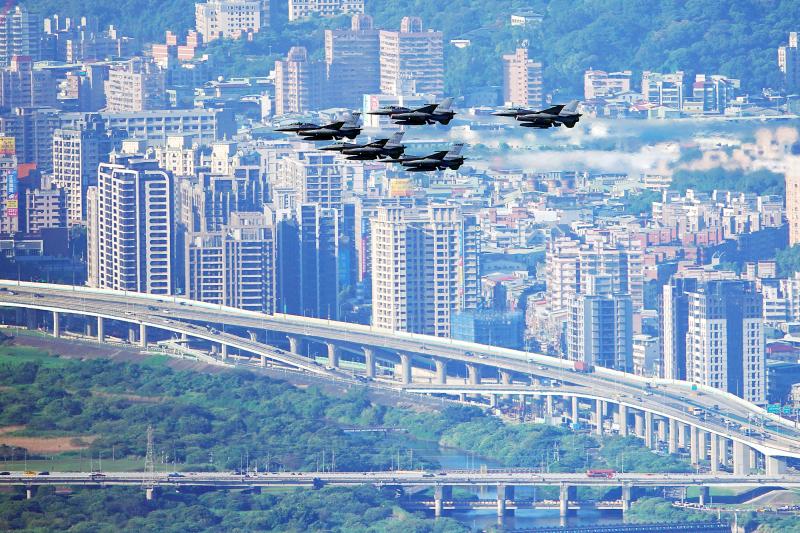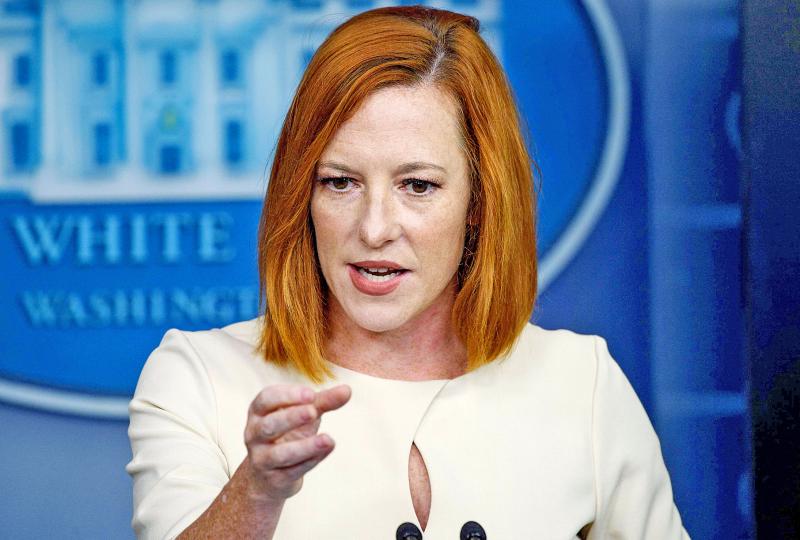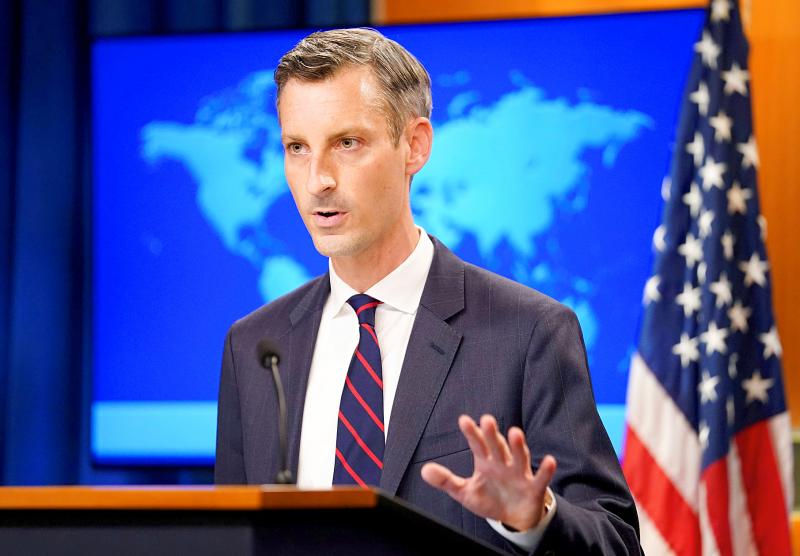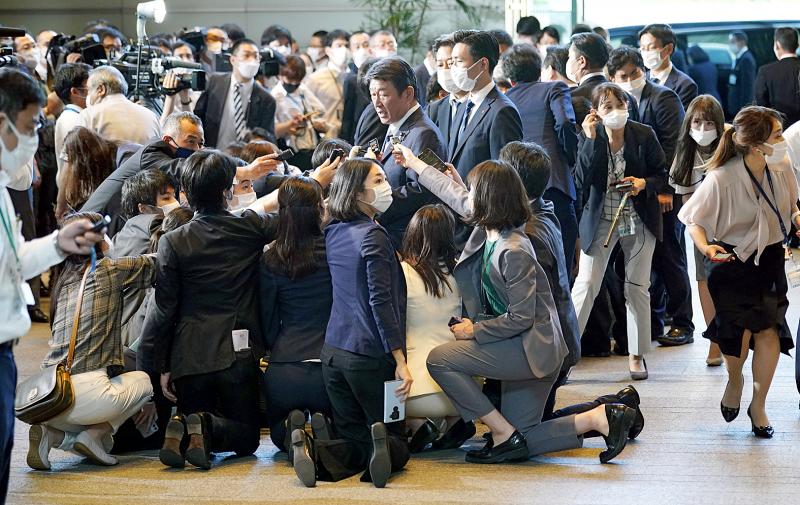Taiwan needs to be on alert for China’s “over the top” military activities, Premier Su Tseng-chang (蘇貞昌) said yesterday, after a record 56 Chinese aircraft flew into Taiwan’s air defense identification zone on Monday.
Taiwan has reported 148 Chinese air force planes in the southern and southwestern part of its air defense zone over four days beginning on Friday, the same day China marked its National Day.
The tensions are being viewed with increasing concern by the international community. Japan and Australia yesterday urged the two nations to talk, while the US said it has been “conveying clear messages” after what it described as destabilizing activities by China.

Photo: CNA
Taiwan calls China’s repeated nearby military activities “gray zone” warfare, designed to wear out Taiwanese forces by making them scramble repeatedly, as well as to test Taiwan’s responses.
“Taiwan must be on alert. China is more and more over the top,” Su told reporters in Taipei. “The world has also seen China’s repeated violations of regional peace and pressure on Taiwan.”
Taiwan needs to “strengthen itself” and come together as one, he said.

Photo: AFP
“Only then will countries that want to annex Taiwan not dare to easily resort to force. Only when we help ourselves can others help us,” he added.
The Chinese aircraft have not been flying in Taiwan’s air space, but its air defense identification zone, a broader area Taiwan monitors and patrols that acts to give it more time to respond to any threats.
The White House has called out China’s “provocative military activity” near Taiwan.

Photo: Reuters
“We remain concerned by the People’s Republic of China’s provocative military activity near Taiwan, which is destabilizing, risks miscalculations and undermines regional peace and stability,” White House press secretary Jen Psaki said at a news briefing on Monday, when asked about the issue.
She urged Beijing to cease all kinds of pressure and coercion against Taiwan, and said the US has an abiding interest in peace and stability across the Taiwan Strait, and would therefore continue to assist Taiwan in maintaining a sufficient self-defense capability.
US Department of State spokesman Ned Price echoed Psaki during a separate briefing, saying that the US “strongly urged” Beijing to cease its military, diplomatic and economic pressure and coercion against Taiwan.

Photo: EPA-EFE
Former US secretary of state Mike Pompeo also weighed in, posting on Twitter an article on the Chinese warplanes’ recent incursions and saying that the US must always stand with Taiwan.
In a sign of the fraught atmosphere, a security source confirmed reports in Taiwanese media that a Chinese pilot responded to a radio warning to leave the area on Sunday with an expletive.
The Chinese Ministry of National Defense did not respond to a request for comment.
Japan also weighed in yesterday, saying it was watching the situation closely, and hoped Taiwan and China could resolve their differences through talks.
“Japan believes that it is crucial for the situation surrounding Taiwan to be peaceful and stable,” Japanese Minister of Foreign Affairs Toshimitsu Motegi said in Tokyo.
“Additionally, instead of simply monitoring the situation, we hope to weigh the various possible scenarios that may arise to consider what options we have, as well as the preparations we must make,” he said.
The Japanese, US, British, Dutch, Canadian and New Zealand navies held joint drills near Okinawa over the weekend, including US and British aircraft carriers.
The Australian Department of Foreign Affairs said it too was concerned by China’s increased air incursions.
“Resolution of differences over Taiwan and other regional issues must be achieved peacefully through dialogue and without the threat or use of force or coercion,” it said.

A magnitude 5.6 earthquake struck off the coast of Yilan County at 12:37pm today, with clear shaking felt across much of northern Taiwan. There were no immediate reports of damage. The epicenter of the quake was 16.9km east-southeast of Yilan County Hall offshore at a depth of 66.8km, Central Weather Administration (CWA) data showed. The maximum intensity registered at a 4 in Yilan County’s Nanao Township (南澳) on Taiwan’s seven-tier scale. Other parts of Yilan, as well as certain areas of Hualien County, Taipei, New Taipei City, Taoyuan, Hsinchu County, Taichung and Miaoli County, recorded intensities of 3. Residents of Yilan County and Taipei received

Taiwan has secured another breakthrough in fruit exports, with jujubes, dragon fruit and lychees approved for shipment to the EU, the Ministry of Agriculture said yesterday. The Animal and Plant Health Inspection Agency on Thursday received formal notification of the approval from the EU, the ministry said, adding that the decision was expected to expand Taiwanese fruit producers’ access to high-end European markets. Taiwan exported 126 tonnes of lychees last year, valued at US$1.48 million, with Japan accounting for 102 tonnes. Other export destinations included New Zealand, Hong Kong, the US and Australia, ministry data showed. Jujube exports totaled 103 tonnes, valued at

TRUST: The KMT said it respected the US’ timing and considerations, and hoped it would continue to honor its commitments to helping Taiwan bolster its defenses and deterrence US President Donald Trump is delaying a multibillion-dollar arms sale to Taiwan to ensure his visit to Beijing is successful, a New York Times report said. The weapons sales package has stalled in the US Department of State, the report said, citing US officials it did not identify. The White House has told agencies not to push forward ahead of Trump’s meeting with Chinese President Xi Jinping (習近平), it said. The two last month held a phone call to discuss trade and geopolitical flashpoints ahead of the summit. Xi raised the Taiwan issue and urged the US to handle arms sales to

BIG SPENDERS: Foreign investors bought the most Taiwan equities since 2005, signaling confidence that an AI boom would continue to benefit chipmakers Taiwan Semiconductor Manufacturing Co’s (TSMC, 台積電) market capitalization swelled to US$2 trillion for the first time following a 4.25 percent rally in its American depositary receipts (ADR) overnight, putting the world’s biggest contract chipmaker sixth on the list of the world’s biggest companies by market capitalization, just behind Amazon.com Inc. The site CompaniesMarketcap.com ranked TSMC ahead of Saudi Aramco and Meta Platforms Inc. The Taiwanese company’s ADRs on Tuesday surged to US$385.75 on the New York Stock Exchange, as strong demand for artificial intelligence (AI) applications led to chip supply constraints and boost revenue growth to record-breaking levels. Each TSMC ADR represents